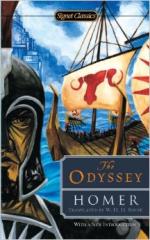|
|
The Odyssey Book 1
The singer begins this epic song with an invocation to the muses referring to Odysseus' long journey home and introducing the main themes of the text: Odysseus' wandering; the entrance of Telemachus into manhood; and their vengeance on the suitors. All the gods but Poseidon pity Odysseus. The singer's narrative begins on Mt. Olympos where the gods are gathered for a feast. They are discussing Aegisthus who has just been killed by Orestes the son of Agamemnon. Zeus speaks first:
"My word, how mortals take the gods to task!
All their afflictions come from us, we hear.
And what of their own failings? Greed and folly
double the suffering in the lot of man.
See how Aigisthos, for his double portion,
stole Agamemnon's wife and killed the soldier on his homecoming day.
And yet Aigisthos knew what doom lay in this." Book 1, lines 48 - 55
Orestes has recently killed his mother Clytemnestra and her lover, Aegisthus, to avenge his father. Zeus believes that Orestes did what was right because the gods had warned Aegisthus. Athena interrupts and pleads with Zeus to turn his attention to Odysseus who suffers on the island of Calypso. Zeus reminds her that Poseidon is still angry at Odysseus because he blinded his son Polyphemus. Nevertheless, she asks Zeus to send Hermes to Calypso to tell her to release Odysseus so he may return home. Zeus assents to this. Then Athena takes up her spear and goes to Ithaca to warn the suitors to leave before Odysseus returns. She finds the suitors and Telemachus sees her while daydreaming: "what if his great father/ came from the unknown world and drove these men/ like dead leaves through the place" Book 1, lines 145-7. He leads the disguised goddess into the feast where the servants are hustling about to please the suitors. There is a roast being served and a singer performing... Telemachus makes an excuse for the opulent show and asks her where she is from (she is disguised as a man). She tells him that she is Mentes from Taphos and has come because she heard that Odysseus has returned home. She asks him if he is Odysseus' son and he replies:
"Friend, let me put it in the plainest way.
My mother says I am his son; I know not
surely. Who has known his own engendering?
I wish at least I had some happy man
as father, going old in his house-
but unknown death and silence are the fate
of him that, since you ask, they call my father." Book 1, lines 258-64
Athena confirms his lineage for him and asks about the feast that is being carried on. He tells her that these men are the lords of the island courting Penelope. They hang around wasting the family's wealth because there is no one to fight them off. Penelope does not dare deny them, but she does not want to marry any of them. Athena tells Telemachus a story of when she saw Odysseus in a feast at her father's house. She advises him to go abroad for news to Nestor and Menelaus to confirm or deny his father's death. She gives him Orestes as an acceptable model of revenge. When she begins to leave, Telemachus stops her and offers hospitality to her. She explains that she is a merchant and must go attend to her business. As she lives she replenishes his spirit with thoughts of his father. He returns to the suitors.
The minstrel continues to sing inside about the homecoming of the heroes from the siege of Troy. Penelope reaches out in tears and asks him not to sing such a sad story because Odysseus has not returned. Telemachus intervenes and tells her that it is a good song for other people and it should be heard. She retires to her bedroom. The suitors begin to explain profanely how they would like to sleep with her and Telemachus tells them they will have to leave tomorrow. Antinous responds to Telemachus: "Zeus forbid you should be king in Ithaka!" Book 1, line 436. Telemachus explains that he does not want to be king; he just wants control of his own unravaged household. Eurymachus asks where the stranger came from and whether or not he brought news of Odysseus. Telemachus recounts the tale of Athena.
"So said Telemakhos, though in his heart
he knew his visitor had been immortal.
But now the suitors turned to play again
with dance and haunting song. They played till nightfall
indeed black night came on them at their pleasure.
and half asleep they left, each for his home." Book 1, lines 472-7
Telemachus goes to his room and undresses for sleep.
Topic Tracking: Disguise and Deceit 1
Topic Tracking: Journeys 1




